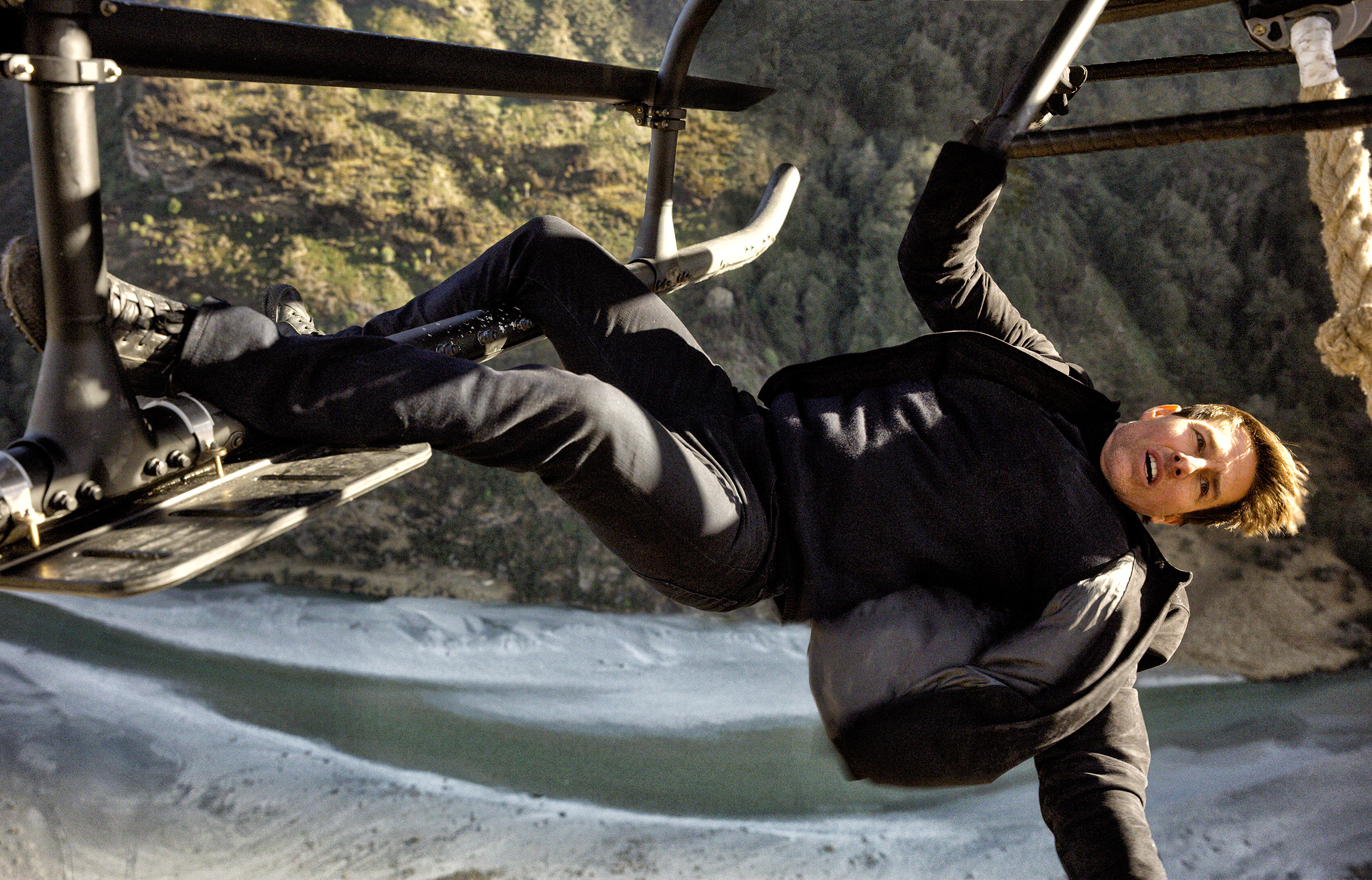Mission: Impossible–Fallout
Christopher McQuarrie (2018)
[av_image src=’http://jayruud.com/wp-content/uploads/2014/08/Tennyson-180×180.jpg’ attachment=’77’ attachment_size=’square’ align=’left’ animation=’left-to-right’ link=” target=” styling=” caption=’yes’ font_size=” appearance=’on-hover’]
If a two-and-a-half hour roller-coaster ride is your idea of a good time, then you’re going to love this latest installment in the Mission: Impossible franchise. Tom Cruise is back as Ethan Hunt, pushing his 56-year-old body through reckless motorcycle pursuits through Paris streets, chases on foot through London skyways, and wild helicopter crashes through the skies of Kashmir with stunts that surpass the ones performed by the 34-year-old version of Cruise in the original Mission: Impossible. Did even Harrison Ford do as much in his mid-fifties? Can we expect the same of Wayne Johnson in another ten years? Cruise is nothing short of phenomenal as he powers through most of these stunts himself: the guy is running, leaping, climbing, hanging off helicopters, even breaking his ankle apparently after one stunt. As Ving Rhames says at one point in the film, “same old Ethan.”
Yes, Rhames is back as Luther for his fourth straight MI film, and Simon Pegg returns as his pal Benji for the third time. These two sidekicks go a long way toward creating the camaraderie and the relatively light atmosphere in these conventionally high-tech spy thrillers. Also back is love interest Ilsa Faust (Swedish actress Rebecca Ferguson, recently seen in The Greatest Showman). Faust is a former British agent who wants to go home but whom MI6 will not allow to return to her country unless she completes a secret task for them. But in a surprising return, Ethan’s ex Julia Meade-Hunt, whom he separated from for her own safety in MI3, pops back into his life. Julia is played by Michelle Monaghan (Patriots Day), who looks enough like Fergusson to keep me confused as to who was who for the first part of the movie. I guess Ethan knows what he likes.
Add to these a new mysterious siren/arms dealer known as the White Widow (Emmy-nominated Vanessa Kirby from TV’s The Crown), who is the daughter, McQuarrie reveals (in an offhand remark she makes that 99% of the audience, including myself, would miss but that my awesome wife Stacey Margaret Jones did not), of the arms dealer Max (Vanesa Redgrave) from Brian de Palmas inaugural Mission:Impossible film. Alec Baldwin returns as IMF boss Alan Hunley and Angela Bassett is introduced as CIA director Erica Sloan. Add Sean Harris returning from Rogue Nation as the incredibly creepy anarchist mastermind Solomon Lane, and Fallout boasts a promising cast. But the really inspired casting coup in this film is giving Ethan Superman as his new partner.
Yes, Henry Cavill (The DC universe’s Man of Steel) plays CIA agent August Walker, Sloan’s right-hand man, who tags along on Hunt’s mission and helps to make it not just impossible, but downright difficult.
The plot, should you care to accept it, begins, as usual, with the taped summary of background information made famous by the original Mission: Impossible TV show and maintained in the films as an elegant and efficient way of getting any pesky exposition out of the way: So there are these three plutonium cores that have gone missing, along with a famous Norwegian (?) nuclear scientist named Nils Debruuk (Kistoffer Joner of The Revenant). Debruuk is presumably helping an arms dealer named John Lark and his gang of global baddies, all of whom are apostles of the villain from the last MI film, Solomon Lane (and who call themselves, of course, the Apostles) to build three nuclear devices with the aim of destroying holy sites at Rome, Jerusalem, and Mecca in the hope of bringing about some sort of global religious bloodbath.
Ethan, however, mishandles the exchange he and his crew have arranged with the arms dealers, because the villains have captured Luther and are threatening to kill him. Ethan’s choice to save Luther costs him the plutonium, and also costs him the trust of CIA director Sloan, who insists that Walker (who does not share Ethan’s scruples about keeping down the body count) should tag along as her watchdog when Ethan goes after the plutonium again. The other result of the loss of the plutonium is that Ethan, disguised as Lark, must now negotiate with the White Widow in order to recover those bomb cores.
As far as plot goes, that’s about it. Christopher McQuarrie, who directed the previous MI installment and is back as director and writer for this one, is not concerned here with penning a screenplay worthy of an Oscar nomination (as he did with The Usual Suspects). His goal here is to string together one action set piece after another in rapid succession, with just enough dialogue to give the audience a breather in between.
So this really isn’t a movie you want to go to for the intricacies of the plot, though there are one or two surprises (which are telegraphed pretty far ahead of time). It’s not a movie that you go to for its brilliant dialogue and complex character development: people are pretty simply good or bad, and Ethan Hunt is not really a character who has ever been all that relatable. Compared with other similar action-film franchises, you tend to care about James Bond or Jason Bourne as a person, but Ethan is more of a blank slate, a guy who performs remarkable stunts but whose inner life is not all that evident, and is never the focus of the film. And this is not a movie that you go to because of its profound political or social themes: people who want to blow things up are bad, people who want to keep things from blowing up are good—that seems to be the main political message of the film. On a slightly deeper level, Ethan cares about taking as few lives as possible, while others—Sloan and Walker in particular—don’t seem to care how many lives are lost as long as they achieve the objective: “That’s the job,” Sloan says.
What you do want to go to this movie for are the action scenes, which take up most of the film and are knit together by brief bits of dialogue that advance the plot, such as it is. But the action scenes are quite adrenalin inducing: Cruise and Cavill leap from a plane to parachute into Paris (why they have to get there this way is never convincingly established) and into a lightning storm, free-falling some 25,000 feet. Cavill, Cruise, and Liang Yang engage in a memorable three-way hand-to-hand brawl in a huge men’s room that leaves a lot of broken glass, porcelain, and busted dry-wall for the poor custodians to clean up; but the fight is a carefully choreographed dance, a fact that becomes apparent at one point when the rhythm of the punches thrown actually mimics the individual notes of the familiar Mission: Impossible theme song. There’s a motorcycle-car-motorboat chase through Paris and there’s a frenetic footrace through London that involves leaps from windows and between buildings. And there’s a final helicopter chase/battle in which Cruise actually was flying his own copter. This incredibly tense scene is set in Kashmir, but apparently was actually filmed in three different countries, one of which was Norway (does that explain the Norwegian rocket scientist?), and then spliced together into a seamless whole in the editing room. And each of these scenes was filmed the old-fashioned way: in the actual physical world, without a blue-screen background or CGI effects. That is what makes them so impressive, so pristine, so viscerally real. They don’t make movies like this anymore. At least not often.
This movie is not going to change your life, and you’re not going to come away quoting the scintillating dialogue or with a profound new insight into the human condition. But the action scenes will keep you on the edge of your seat for the full 147-minute running time. Three Tennysons for this one.
NOW AVAILABLE:
If you like these reviews, you might enjoy Jay Ruud’s most recent novel, now available from the publisher at https://encirclepub.com/product/the-bleak-and-empty-sea/. Also available from Amazon or Barnes and Noble.
When word comes to Camelot that Sir Tristram has died in Brittany of wounds suffered in a skirmish, and that his longtime mistress, La Belle Isolde, Queen of Cornwall, has subsequently died herself of a broken heart, Queen Guinevere and her trusted lady Rosemounde immediately suspect that there is more to the story of the lovers’ deaths than they are being told. It is up to Merlin and his faithful assistant, Gildas of Cornwall, to find the truth behind the myths and half-truths surrounding these untimely deaths. By the time they are finally able to uncover the truth, Gildas and Merlin have lost one companion and are in danger of losing their own lives.
Order from Amazon here: https://www.amazon.com/Bleak-Empty-Sea-Tristram-Mystery/dp/1893035735/ref=sr_1_1?s=books&ie=UTF8&qid=1503328086&sr=1-1&keywords=Bleak+and+Empty+Sea
Order from Barnes and Noble here: https://www.barnesandnoble.com/w/the-bleak-and-empty-sea-jay-ruud/1126958139?ean=9781893035737


